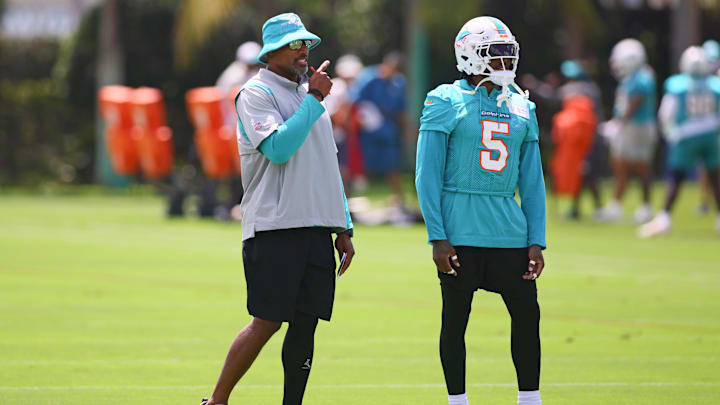Why Anthony Weaver Sees Similarities Between Miami Dolphins and The Legendary 2000 Baltimore Ravens

It's no secret that Miami Dolphins defensive coordinator Anthony Weaver deeply admires the Baltimore Ravens, the team for which he spent years as a player and a coach.
But as he embarks on his new role in Miami, Weaver believes the Dolphins have the potential to build a defense with the same "dawg mentality" that has defined the Ravens' success for decades — Baltimore has finished in the top 10 in total defense 18 times in the 24 seasons of the 2000s, with 10 top-5 finishes.
Weaver knows what makes Baltimore's defense unique but also sees the similarities in how his new defensive unit can match that intensity and set the tone on game day.
"I think there's so much ingrained in the [Ravens] building just from that 2000 Super Bowl team, and the fabric of that team. You still feel it when you walk between those walls," said Weaver, who played for Baltimore from 2002-05 and was an assistant coach from 2021-23. "We're building towards that. I think we have the men in this locker room to get that done."
The Ravens' defense has long been known for its physicality, versatility, and ability to close out games.
"Why that sustains in Baltimore is because they finished the job in 2000," Weaver said. "We have everybody in this building to have that type of dawg mentality. But ultimately, you got to win it all if you want it to be long-lasting."
How Weaver Can Elevate The Miami Defense
Weaver believes that Miami's defense can elevate to the next level by adopting some of the core principles that made Baltimore's defense so formidable.
One key to Baltimore's defensive success is versatility, particularly its ability to deploy different personnel packages to keep offenses guessing.
Weaver shared how important this adaptability is, especially when dealing with injuries.
"You're definitely going to see a combination of three safeties at some point," Weaver said, "We want our best 11 on the field, and one of those guys needs to be there."
Weaver said his experience calling plays for the first time in Houston in 2020 prepared him for this new role. He credited his time in Baltimore with refining his knowledge and leadership skills, which he learned from former Texans head coach and longtime defensive coordinator Romeo Crennel and Ravens head coach John Harbaugh.
"In 2021, I turned down a coordinator opportunity to go to Baltimore because I knew I was lacking in scheme knowledge," Weaver said. "Baltimore had played really good defense for a number of years, and I wanted to make sure I was fully prepared the next time I had an opportunity."
It's not just about X's and O's for Weaver — it's about instilling a culture that demands excellence in every play.
"We're building towards that," he said. "But it starts with having the mind-set to finish, just like Baltimore did in 2000. We have the players to do it. Now it's about getting it done on the field."
Weaver knows he inherited a Dolphins defense that finished third in the NFL with 56 sacks, 10th in yards allowed per game, and 12th in turnovers (25) last season. Still, his goal is to transform the unit into one that competes at the highest level and carries the attitude and resilience that has made his former team a defensive powerhouse for over two decades.
For the Dolphins, it's about embracing that "dawg mentality" and, as Weaver said, finishing the job.
